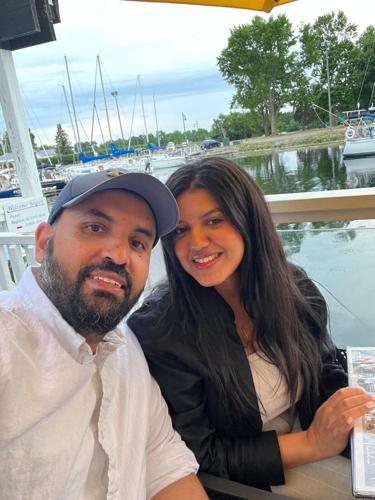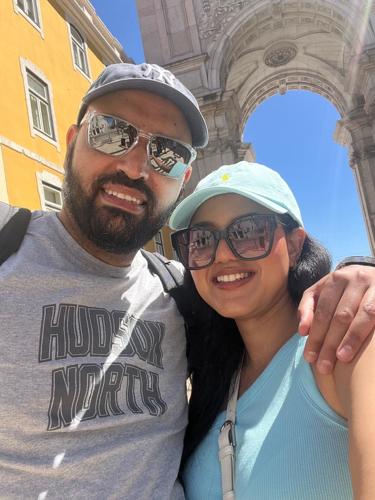It wasnŌĆÖt planned and she didnŌĆÖt want to, not at first.
But Hind Iguernane and Aziz Benharref, residents of the Ottawa suburb of Orleans, were coming to the end of their first full day in the Portuguese capital. They had visited the cathedral, explored the historic Alfama district and bought souvenirs for friends and family back home.
And at 6 p.m., the couple arrived before the iconic bright yellow funicular that has been in operation since 1885. Known as the Gloria Elevator, it was one more of those things that makes Lisbon, well, Lisbon.
ŌĆ£We took photos. We didnŌĆÖt even plan to go on it. But then he said to me, ŌĆśCome on, itŌĆÖs part of the experience. You can do it,ŌĆÖŌĆØ Iguernane, 32, told the Star.
Benharref was the adventurous type ŌĆö outgoing, sociable, up for anything. Iguernane was the opposite.
ŌĆ£He knows that IŌĆÖm not that courageous, but he reassured me that it was not a big deal, that it went really slow,ŌĆØ she said.
ŌĆ£We were the very last ones to get on board.ŌĆØ
The married couple made their way to the very back of the funicular, which has two long wooden benches on either side and space for about 40 people. A man slid over to make space for Iguernane. Then others shuffled to make room for 42-year-old Benharref as well, but the Morocco-born Canadian citizen insisted that Iguernane take the spot at the very end of the bench, to spare her being sandwiched in between two people.
ŌĆ£Sometimes I get this guilty feeling,ŌĆØ said Iguernane, a Casablanca-born Canadian permanent resident. ŌĆ£I tell myself that if he had been in my place, it would have been different.ŌĆØ
When everyone had taken their seats, the trip ŌĆö a steep, sharp descent from LisbonŌĆÖs Bairro Alto neighbourhood down 265 metres to the foot of Avenida da Liberdade, the cityŌĆÖs main commercial thoroughfare ŌĆö was set to begin.
As soon as the doors to the funicular car closed, there was a loud, unexplained noise. Iguernane told her husband that she was frightened but he tried to reassure her, telling her that everything was normal, that everything was fine, that she had nothing to worry about.
But then she looked up to the front of the funicular car and saw the driver.
ŌĆ£He was in a panic. There was a kind of steering wheel, and he was trying to turn it quickly to get control,ŌĆØ she said.
ŌĆ£And then everyone started screaming.ŌĆØ

Canadian Aziz Benharref, 42, was killed in the Sept. 3 funicular crash in Lisbon while visiting the Portuguese capital with his wife, Hind Iguernane, a Canadian permanent resident.
Courtesy of Hind IguernaneThe Sept. 3 funicular crash killed 16 people and left another two-dozen people with injuries of varying severity. Investigators have determined that a thick steel cable along which the funicular car runs, snapped, causing the driver to lose control despite the application of the carŌĆÖs braking systems.
Among the dead were two Canadian citizens, Benharref and Andr├® Bergeron, a retired archeologist with the Quebec government. BergeronŌĆÖs wife, Blandine Daux, a French citizen who specialized in restoring heritage items with the Centre de conservation du Quebec in Quebec City, was also killed in the crash.
Iguernane, 32, spoke to the Star from the Lisbon hospital where she is being treated after suffering a fractured hip in the crash.
Her life for the last week has been a series of agonizing unanswered questions. The most recent is whether she will be cleared by doctors to fly to El Jadida, the Moroccan port city where her husband was born and raised, in time to attend his funeral.
But in the minutes and hours and days that followed last weekŌĆÖs funicular crash, her only desire was to know what had happened to Benharref.
The uncontrolled descent had been rapid and terrifying. The impact when the car derailed at a turn in the tracks and struck a building was brutal.
ŌĆ£I prayed and prayed, right up until the crash and then I tried to call out to Aziz but there was no response,ŌĆØ Iguernane said. ŌĆ£There was silence. No one answered. Everyone was in shock.ŌĆØ
Her arm was pinned against a wooden beam, and she felt a pain in her neck that prevented her from turning her head. But she sensed and felt and believed that her husband was still there beside her.
So she did the only thing that she could.
ŌĆ£I saw a little light, I reached out my hand and cried for help. And then a man ŌĆö I think he was Portuguese ŌĆö arrived and he took my hand and he tried to reassure me,ŌĆØ she recalled. ŌĆ£I wasnŌĆÖt aware of the pain. I knew that I was injured, that there was blood. I had all sort of cuts to my face. I saw people around me. And then the first responders pulled me out.ŌĆØ
Of those initial hours, Iguernane remembers only the blur of the hospital ceiling lingering above her as she lay on a gurney, sedated for the pain and waiting to be taken for scans and tests to assess her injuries.
Once she was taken in for treatment, she asked anyone ŌĆö doctors, nurses, cleaners, everyone ŌĆö who arrived at her bedside for news of Benharref. She knew that her husband had been wearing shorts and, in those shorts, carried his wallet and driverŌĆÖs license.
Each time the response was the same: that he was not among the list of dead or missing; that the funicular passengers had been taken to nine hospitals throughout the city; that there were injured people who had not yet been identified.
Iguernane lost her telephone in the crash but was able to send an email to her brother in Canada. From afar, he made contact with a Facebook group of students in Lisbon and arranged for a couple from Algeria and Morocco to visit his sister in the hospital, to be at her bedside at least until family members could get to Portugal.
This was followed by visits from the Canadian and Moroccan ambassadors to Portugal, who offered support, but no answers about the fate of her husband.
ŌĆ£I prayed for him. I knew that he was strong. I told myself that my husband is a fighter. HeŌĆÖs someone who will fight. And I prayed, I prayed ŌĆ”ŌĆØ
When Iguernane and BenharrefŌĆÖs family arrived in Lisbon, her determined, insistent hope began to fade. She could see it in their eyes, that something wasnŌĆÖt right.
ŌĆ£They knew something, but they didnŌĆÖt want to tell me because they werenŌĆÖt 100 per cent certain,ŌĆØ she said.
It was two days after the deadly accident that Iguernane learned that she had been widowed. The horrible revelation was made by a Portuguese psychologist who spoke broken English and BenharrefŌĆÖs brother, whose DNA was required to positively identify the remains.
Doctors are doing final tests to see if an injury to Iguernane’s lung that she suffered in the crash is serious enough to prevent her from flying. She is waiting for the results to know whether and how she can travel to Morocco to bury her husband.
“If everything is OK, we will all go. If not, I don’t want to keep him here. I will stay here if I have to and let him go back to his family so they can bury him and grieve,” she said.
Her friends and brother have also launched a to help cover her expenses, medical costs and other financial concerns.
“Hind has always been the kind of person who lifts others up,” the campaign organizer wrote. “Now it’s our turn to support her.”
From her hospital bed in Lisbon, grieving her husband, grieving the life they were building together in a new country ŌĆö one where she said Benharref loved nothing more on a wintery day than clearing the snow not only from their driveway, but from the driveways of anyone who needed a helping hand ŌĆö Iguernane is not thinking about finances.
“I lost my husband. I need compassion. I need people to pray for him. I need to tell his story, and my story.”
It’s the story of a man who met a woman while working in Morocco, who wrote to her on Facebook to see if she was interested in becoming something more than a colleague, who convinced her to share in his dream of making a life in Canada despite the difficulties of paperwork and bureaucracy, the interminable wait for approval, the long-distance relationship and the time apart.
“I want to send a message to couples, to families, to be thankful for their spouses, for their children,” she said. “To be thankful for them because we don’t know when it will be taken away.”



























